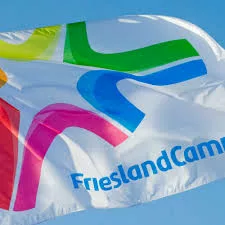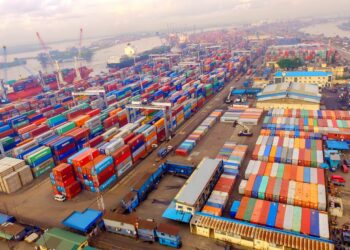Nigeria’s milk production accounts for only 13 per cent of West African production and 0.01 per cent of global dairy output and the gap between supply and demand for dairy products is widening as a result of an increase in population and urbanization.
Some published estimates for local production of dairy in Nigeria is around 600,000-700,000 tonnes of milk per annum whilst the consumption is around 1.7-1.8 million tonnes; the gap between local production and consumption is the reason for importation.
Interestingly, the per capita consumption of milk in Nigeria is 8 litres per year, representing very low consumption levels when compared with the global averages of 44 litres of milk.
The trend is however, changing with clear vision and intervention measures provided by FrieslandCampina WAMCO, with the belief that a strong agricultural sector contributes to a stable society. The firm is in partnership with the Nigerian Government to accelerate development in the local dairy sector, and give the national economy a boost.
FrieslandCampina WAMCO pioneered its first backward integration in the early 1980s through the establishment of a dairy farm located in Vom, Plateau State.
Thereafter, the Company integrated all the learnings and launched a more sustainable dairy value chain model in 2010. Since launch, this initiative has achieved significant milestones and has developed new institutional capacities, policies and practices that benefit pastoralists, small- holder farmers and the dairy industry at large in collaboration with its partners.
FrieslandCampina WAMCO’s long-term commitment to shared value is evident in its support for local dairy communities, driving economic growth, empowering dairy farmers, and nourishing the population with affordable milk products.
Through its Dairy Development initiative, the Company is transforming the dairy value chain, creating shared value, and contributing to the achievement of the United Nations’ Sustainable Development Goals (SDGs).
The Company’s Dairy Development initiative focuses on working with pastoralists, small holder dairy farmers and commercial farms, with support from Federal Ministry of Agriculture and Rural Development (FMARD), the Central Bank of Nigeria and other strategic partners.
The initiative aims to make dairy farming more attractive to the next generation of farmers, thereby making the sector more sustainable. FrieslandCampina
WAMCO’s Dairy Development currently operates in various communities across Oyo, Osun, Ogun, Kwara, Ondo, Niger, Abuja and recently Vom, Plateau respectively.
The company’s dairy development aims to grow dairy value chains from farm to business by leveraging its dairy expertise and tailoring it to the local situation.
The firm equally strives to let all dairy players in the chain win with fresh milk, thus contributing to food security, a more sustainable milk production and raising the living standards of the dairy farmers from whom it collects milk and through dairy development it is poised to strengthen its investment in Nigeria.
Supporting Local Farmers to Curb Insecurity
The surge in farmer-herder violence in Africa has been concentrated in Nigeria, and the fact that there are geographic hotspots underscores the importance of understanding the local factors responsible for the menace. The most common trigger of farmer-herder conflict is crop damage caused by passing livestock.
The encroachment of cultivated land for use as grazing areas is a reflection of pastoralists’ grievance that their rights to resources be it land, water, wood, or forage are weaker than those of farmers and consequently have been ignored.
Recently, under the Value4Dairy consortium, FrieslandCampina WAMCO collaborated with Barenbrug, one of the world’s leading hybrid pasture seed production company to support and also to make available and accessible quality pasture seeds to the local dairy farmers.
This initiative was established to tackle the issue of quality feed which is one of the major challenges facing dairy development in Nigeria.
During the initial phase, seed trials were conducted with selected dairy farmers. 18 species of pasture seeds were planted on the selected farms to know their adaptability and the corresponding effects on Cow performances.
Out of these, 5 species performed excellently in terms of adaptation and corresponding effect on Cows performances.
The species family distributed to farmers include grasses (tropical and temperate), legumes & herbs and brassica.
Through FrieslandCampina WAMCO’s Dairy Development initiative, local farmers are supported in the production of milk (yield per cow improvement), improving milk quality and hygiene, pasture development, breeding and farm management.
The locally sourced milk from these farmers is collected through its 29 Milk Collection Centres (MCC) in the different farmer communities, then transported to the world-class FrieslandCampina WAMCO plant in Lagos where it is processed into nutritious products for the Nigerian market.
According to the Head of Dairy Development, Adekunle Olayiwola, FrieslandCampina WAMCO’s Dairy Development Programme with support from its strategic partners has successfully improved the livelihood of over 12,000 smallholder dairy farmers and pastoralists organized in 23 cooperatives by empowering and integrating them into
FrieslandCampina WAMCO’s fresh milk supply chain, which provides guaranteed market
access all year around.
In line with its dairy expansion plans, the Company recently commissioned a state-of-the- art factory for the production of NuNu yoghurt, a product made with 100 per cent locally sourced milk and also introduced the new Peak Yoghurt Drink in three distinct flavours (Plain Sweetened, Strawberry and Orange) into the market. Interestingly, Peak Yoghurt recently won “The Most Indigenous Brand of the Year” as it is made from fresh cow milk locally sourced from dairy farmers across the dairy development locations.





